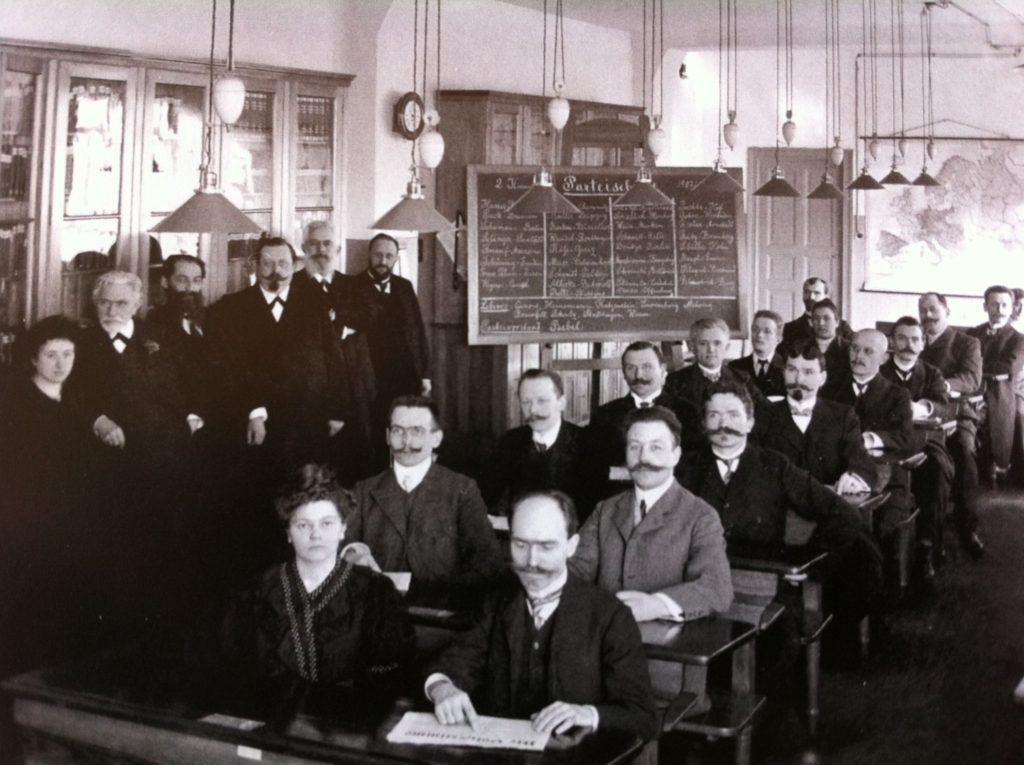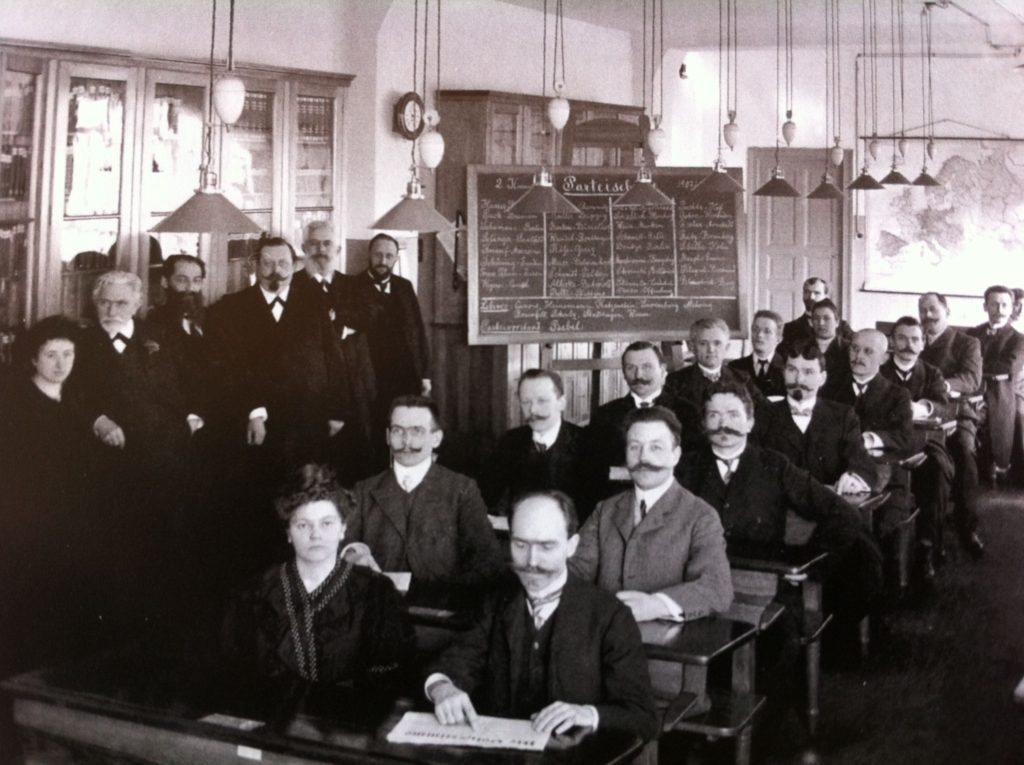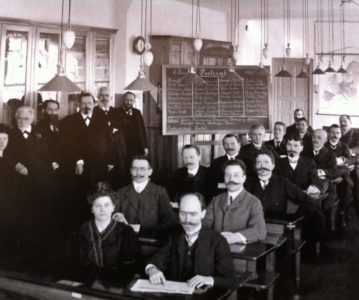Translation and introduction by Rida Vaquas. The original article can be found here.

This article was originally written by Franz Förster (a painter) in 1909, in the leading theoretical journal of the SPD, Die Neue Zeit. It was a direct intervention into a heated debate around what the nature of political education should be taking place with German Social Democracy, which came to a head in the 1908 Nuremberg Party Congress over the curriculum of the party school. Whilst the revisionist wing of the party, including the Comrades Eisner and Maurenbrecher mentioned in this article, argued that the Party School should only teach hard facts and elementary sciences, the radical left, many of whom were employed at the Party School, emphasized the necessity of learning theory. Maurenbrecher was roundly criticized for suggesting it was pointless to learn about value theory unless one was first familiar with Thomas Aquinas. Luxemburg insisted on the need for “the theory which gives us the possibility of systematizing the hard facts and forging them into a deadly weapon”. 1 This kind of insistence on “systematization” is present in this article, with theory being the basis of understanding, as opposed to knowledge of historical individualities.
The purpose of presenting this translation is not simply to provide a rerun for English-speakers about a particular debate within Social Democracy but to point towards the problems in the discussion of political education today, and ways forward. This article is caustic, polemical and eloquent; precisely because of the urgency of establishing what a class-based educational programme should do and how. Workers’ education (Arbeiterbildung) represented a turn away from the people’s education (Volksbildung) organized by philanthropic societies for self-improvement, it was intended to increase workers’ capacity to participate in the class struggle. The debate in the SPD really centered upon what skills are needed in this struggle and, implicitly, what shape this struggle should take.
A hundred years and innumerable defeats later, socialists have found ourselves in the middle of a resurgence of popular interest in “the Left”, however, we are still working out how we can build up socialist political infrastructures at the base of our movement. Perhaps we need to remind ourselves that the historical institutions we look to as models weren’t conjured out of thin air by parties’ in much better situations than us; they were the product of hard and serious fights and constructed out of insufficient and inadequate parts.
Yet we also need to interrogate how political education works, if it is intended to reduce our dependence on leaders. This article rightly argues that “uncritically tailing leaders” conflicts with democratic principles, however, does teaching theory necessarily prevent this outcome if the leaders are the teachers of theory? Everyone who’s been through school knows that education can cement a hierarchy just as much as it can be used to dismantle it. In order to abide by Franz Mehring’s maxim “With the leaders if they are with us; without the leaders if they fail to act; in spite of the leaders if they oppose us”, there has to be the capacity to build shared understandings of the world and social change which do not hinge upon the leader of the moment, nor act as ideological legitimation for them.2 If socialist theory is a “question of life” for the labour movement, we cannot be content with half-hearted gestures towards education being a good idea, but bring it into the realm of political contestation.
A Worker on Workers Education
By Franz Förster
After Comrade Eisner, tucked away in a casual statement made in justified annoyance, portrayed the “theorising” worker as a pitiable creature, who is not to be taken more seriously in his partial education, and even harms the party, it ought to have deterred any thinking Social Democratic worker from concerning himself with theories, let alone writing about them. And yet I dare.
The issues that I want to discuss were touched upon already by Comrade Kautsky in his article “Some Remarks about Marx and Engels”.
The proponents of the Nuremberg educational methods, the comrades Maurenbrecher and Eisner claim that Social Democratic workers need to know nothing about value theory or the materialist conception of history. Why? Because firstly they don’t have sufficient background knowledge, secondly because they don’t have enough time at their disposal which is necessary to work through the required material, according to this perspective. And thirdly, because knowledge of these theories for workers and eventually others represents a redundant luxury that one can do without, which Maurenbrecher demonstrates to us with his own person. Indeed, he doesn’t even hesitate to assert that theory, when taken up by the masses, could paralyse the party’s ability to act.
I will refrain from deriding the logic of Maurenbrecher or this claim, even though this restraint costs a great deal in the face of the situation.
A number of comrades, who were not completely satisfied with the level of understanding for our tasks within our own ranks, believed they could accept the curious assertion of Eisner and Maurenbrecher, without perhaps investigating the issue more precisely for the time being. It would be particularly astonishing if the atmosphere in trade union circles was in favour of the Nuremberg educational methods, when even they have reasons to turn against it. At the very least it is very premature to make the proposed educational methods into a shibboleth of revisionism.
If the proponents of new teaching methods say that workers lack the understanding of elementary knowledge and methodical reasoning that are necessary, this is only partially true. Because if understanding and recognition of value theory and the materialist conception of history only depended on mere reasoning, the entirety of our bourgeois social sciences could not oppose them uncomprehendingly. But it is well-known this is not the case. Countless examples could be invoked which show that many intelligent people, some who are even called Professor, commit the greatest offenses against logic as soon as they have to make a judgment on things which fall outside their bourgeois class interests. These are often offenses at which the class-conscious worker pityingly smiles. The effects of the laws of motion of our economy, discovered by Marx, have been sufficiently demonstrated to the working class first-hand. Their theories let us understand what is already familiar to us. The worker is more disposed to understanding socialist theory than members of other classes because as well as the thirst for knowledge, his class interests lend him support. For him, socialist theories are not academic questions, but questions of life itself. Because if he masters them, they become a powerful weapon in his hand in the struggle against his oppressors.
On the other hand, the academically educated new party member, who comes from the non-proletarian classes and therefore lacks the sharp proletarian class consciousness, has to finally free himself from the fetters of the bourgeois ideology which has been instilled in him. Of course, the proletarian way of thinking presents him with much greater difficulties, since enormous amounts of energy were uselessly consumed in the years of higher education. He is usually tired and resentful that he should now expend effort in learning the ropes of a different method of thinking that is completely alien to him. From this perspective, one can empathize with Comrade Maurenbrecher, that he is trying to save so much of the old cargo on the new ship. A longer quarantine would have done a lot of good here.
“If now the worker thinks, then nonetheless he should concern himself with history first and foremost”, that’s a history of quite a strange kind. Maurenbrecher’s method, to lose yourself in a welter of historical episodes, is a rather dangerous sport. These things have already flown over some people’s heads, so they don’t see the wood for the trees. The parts are more important to them than the whole. The danger of confusion through study of events alien to them, ripped out of context and without theory as rendered in the biographies of great men and princes, is particularly strong amongst workers. The workers, who have the doubtful fortune of having to listen to Comrade Maurenbrecher, only have a jumbled mass of historical details in store for them, without the connecting link of the materialist conception of history, because that is only for the leaders. It would “bamboozle” the heads of the workers. Once this is brought about, the soil is prepared for Maurenbrecher sowing the seeds of his bourgeois worldview, on which he – consciously or unconsciously – still stands with both feet.
From this superficial perspective, that Maurenbrecher wants to restrict the workers to, it follows that he and his friends give particular significance to the political constellation in South Germany, which is not merited. They are lost in trivialities, which will turn out to be illusions when disenchantment occurs.
When Comrade Maurenbrecher and his friend Eisner say: “Theory inhibits swift decisions, it is damaging to routine industrial struggles”, they ought to know, or their friends in trade unions ought to know, that serious struggles are not led with merely feelings and desire. As the goals of trade union struggle, just as much as political struggle, are predominantly economic (or would you dispute this too, Comrade Maurenbrecher?), it is our task, as class-conscious proletarians, to attain a clear account of the character of the economy and of bourgeois society. We achieve this through observation and evaluation of experience, in order to discern the laws of the movement, the decisive conditions for the onset of an event, to uncover the relationships between phenomena. A perspective into the past and future of society is only possible by virtue of awareness of the fundamental interconnections between events, only possible when we adopt the materialist conception of history. It alone enables us to turn the political and trade union movement towards the service of the working class wisely and purposefully, and even to overcome particular limitations.
Unquestionably, all of our knowledge about the infinite abundance of social life is only piecemeal. The nuggets of our more or less substantial knowledge must be brought together through a socialist worldview: this and the materialist conception of history consolidate the countless individual events of human affairs in the past and present into a whole. It is the key to understanding these matters. The understanding of our economy is therefore not dependent on the greater or lesser mass of knowledge you have stored up, but rather that whatever “learning” you have at your disposal is harmoniously unified through a clarified outlook, through a “theory”. That is how a worker can often be wiser and more educated than a heavily taught historian or national economist.
The appeal and impact of our party is also dependent on theoretical understanding. We don’t need blind faith, but rather scientific conviction, which gives us certainty and power. The freedom of action of the masses will not be weakened through this, rather strengthened. It is this insight, this knowledge of relevant factors, which guarantees success. A lack of insight absolutely cannot be replaced by “good leaders”. Aside from the fact that we come into sharp conflict with our democratic principles if we uncritically tail leaders, the history of the workers’ movement up until most recently shows us that a working class which is insufficiently aware of these relationships will deny allegiance even to the best leaders.
Perhaps the events which played out in the Nuremberg Party Congress are bringing forth the benefit that comrades concern themselves more with theoretical questions than they previously did.




